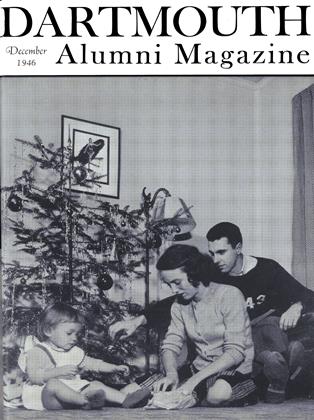FRENCH FOLLIES if OTHER FOLLIES: 20 STORIES FROM THE NEW YORKER
December 1946 Kenneth A. Robinson.by Francis Steegmuller '27. New York. Reynaland Hitchcock. 1946. 174 pp. $2.00.
I think that most Americans who knew France at all well before the war and loved it and yet found certain features of its life at least somewhere near as baffling as certain features of our life must have seemed to the French, will want to read Mr. Steegmuller's book. For while they may not have been baffled by precisely the same things that baffled Mr. Steegmuller getting a telephone installed, for instance, or sub-renting an apartment in Paris—they surely came in contact with some aspects of the life that Mr. Steegmuller pictures with such accuracy, humor, and real affection, and they must have encountered many of his people.
And every American who knew France as a country where good eating flourished as one of the more agreeable arts of life, whether his taste and means ran to Foyot or to the Rendezvous des Mariniers, ought to read the sketch entitled "Cuisine Francais" which will show him more poignantly than many a more elaborate and pretentious account what eating had become for the Frenchman during the war.
Of the 20 "Follies" in the book, 12 are French Follies. The greater number of these are little comedies of encounter with French life and manners in the years just before the recent war but they are made contemporary by various narrative devises and most of all by the timeless human nature of the characterization. There they are the parents in the "stone house on the Grande Rue, just opposite the butcher shop"; the telephone functionary in his formal clothes; the masseur who says to his client "The slightest change would be sacrilege! Forgive me, Madame, if I refuse to do as you request"; the concierge; the taxi driver; the group encountered in the train. We have known them all or at least their counterparts, and Mr. Steegmuller misses none of their humor or their humanity.
Of the remaining stories in the book, the non-French ones, "The Snake Man" tells how snakes may be induced to leave your premises in Cairo; "Pretzels and Ice Cream" suggests a new combination of flavors that I intend to experiment with; "A Few of Our Things" is an always timely warning against leaving your possessions with your friends. But the story in this section of the book that thrusts itself most piercingly into the consciousness of one reader at least is the story of Ralph, the bus driver from Raton to Albuquerque, with the pair of new cowhide boots that are torturing his swollen feet and that he can't get pulled off. Mr. Steegmuller's Follies are excellent follies.
 View Full Issue
View Full Issue
More From This Issue
-
 Article
ArticleHOPKINS CENTER
December 1946 By SIDNEY C. HAYWARD '26 -
 Article
ArticleON THE HILL
December 1946 -
 Class Notes
Class Notes1918
December 1946 By ERNEST H. EARLEY, DONALD L. BARR -
 Class Notes
Class Notes1928
December 1946 By OSMUN SKINNER, RUPERT C. THOMPSON JR. -
 Class Notes
Class Notes1919
December 1946 By J. KENNETH HUNTINGTON, MAX A. NORTON -
 Class Notes
Class Notes1917
December 1946 By MOTT D. BROWN, DONALD BROOKS
Books
-
 Books
BooksMAKING BETTER MOVIES.
April 1933 -
 Books
BooksHoarding or Sharing
May 1975 By DENIS G. SULLIVAN -
 Books
BooksCOMBAT MISSILEMAN.
June 1962 By HOWARD F. EATON -
 Books
BooksThe Development of The American Short Story
December, 1923 By K.A.R. -
 Books
BooksTHE BOOK OF THE WHITE MOUNTAINS
November, 1930 By N. L. Goodrich -
 Books
BooksLETTERS ON THE ORNITHOLOGY OF BUENOS AYRES
July 1951 By Wedgwood Bowen

